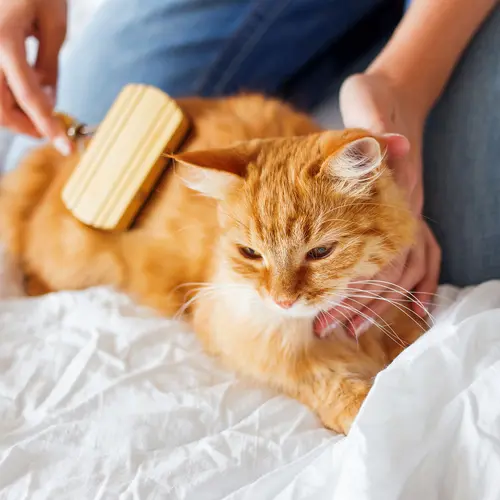Miniature goats are increasingly popular as pets, which is no surprise given how adorable and friendly they are. Although these smaller breeds of goats can make great family pets, they can be harder to care for than traditional pets such as dogs or cats. Pygmy goats and Nigerian Dwarf goats are popular small goat breeds that many people keep as pets. However, goats are considered livestock, so you may need to check with your homeowner's association, local zoning laws, and any other applicable regulations before you decide to bring one home.
Pygmy Goats
Pygmy goats originated in West Africa. Originally named the Cameroon Dwarf Goat, pygmy goats made their way from Africa to zoos in Sweden, eventually ending up in America in 1959. Pygmies are characterized by medium to long straight hair.
Pygmy goats can thrive in almost all climates. Their docile, pleasant nature makes them ideal for family pets. They are also prized for their milk production and are prolific breeders, usually producing one to four offspring every 9 to 12 months. They're active and fun-loving animals that need space to exercise.
What do pygmy goats eat? Providing your pygmy goat with an appropriate diet is the most important thing you can do to keep them in good health. Most health issues in goats are caused by an inappropriate diet. Goats should not be fed human food. Most of their diet should be composed of food they can forage, such as grass and hay. You should only give them minimal amounts of pellet feed or grain, since they can gain weight easily. Pellet feed and grain can also cause miniature goats to develop bladder stones, which can block their urethra and cause death if untreated. They also need access to a mineral block or loose mineral that's designed to complement their diet of grass and hay. Make sure they have plenty of fresh, clean water available at all times.
How long do pygmy goats live? The average lifespan of a pygmy goat is 10 to 15 years, so you should be prepared for a long-term commitment if you decide to keep one.
You can help your pygmy goat live a longer, healthier life by ensuring they have proper veterinary care. They should be vaccinated yearly with a CD&T vaccine that protects against overeating disease and tetanus. As part of their routine healthcare, you should also monitor them for evidence of gastrointestinal parasites that can cause diarrhea and anemia. Your veterinarian can put your goat on a preventative worm control regimen.
Nigerian Dwarf Goats
Nigerian Dwarf Goats are another very popular breed of miniature goats. Like pygmy goats, they originated in Western Africa but are now found throughout the world. They share many similarities with pygmy goats, but they are a distinct breed. While pygmy goats are bred to have a cubby appearance, Nigerian Dwarf Goats are bred to look more like traditional dairy goats.
Dwarf goats are fun and lovable. They have a gentle nature that makes them particularly well-suited for children to raise. Many young children raise them for 4-H projects. They're excellent mothers and can produce three to four pounds of milk daily.
Caring for Miniature Goats
In addition to providing a proper diet for your miniature goats, you must ensure they have a safe and enriching environment.
Toxic and poisonous plants. Despite widespread belief, goats can't eat just anything. Many plants are harmful to goats, so they shouldn't be unsupervised in areas where you can't control what plants they have access to. Well-fed goats are less likely to ingest poison since they aren't as hungry. A hungry goat will be less discriminating about what it eats, so ensuring your goat has plenty of healthy food is the first step in keeping it safe.
Some plants and substances are toxic in small amounts, while others are toxic over time, with the consumption of large amounts. Some possible toxins you should make sure your goat avoids include:
- All houseplants
- Flowering bulbs
- Landscaping plants
- Herbicides
- Fertilizers
- Pesticides
- Rodent poison
- Creosote-treated wood
- Lead paint
Housing requirements. Goats are herd animals, so they're happier with other goats. They'll need a place to shelter from extreme weather and plenty of room to explore and play. Your accommodations don't have to be fancy, but your goats should be protected from the elements and drafts. Plan for at least 15 to 20 square feet of housing per goat. They'll love niches where they can climb, sleep, and jump. There should be sturdy fencing around their housing and exercise area, so they can come and go as they please. The fencing will keep your goats safe from predators and protect them from toxic plants and other dangers.
Exercise and play. Pygmy goats love to play and exercise. Watching your goats have fun playing is very entertaining. You can encourage their play and provide healthy stimulation by giving them toys and equipment. Although you can design elaborate playgrounds, simple toys will do just as well. Old tires situated about 18 to 24 inches apart will provide a jumping challenge for your goats.
Another fun toy is a teeter-totter made from a log and a 2" x 6" board. Just avoid using a board that's too long so your goats won't get caught underneath. You can also adapt the idea by setting up a balance board with two posts and a cross board. Your goats will have a blast walking across it. Natural materials can also be used for playground equipment for your goats. A fallen tree will give them a place to jump, balance, and play games with each other.
